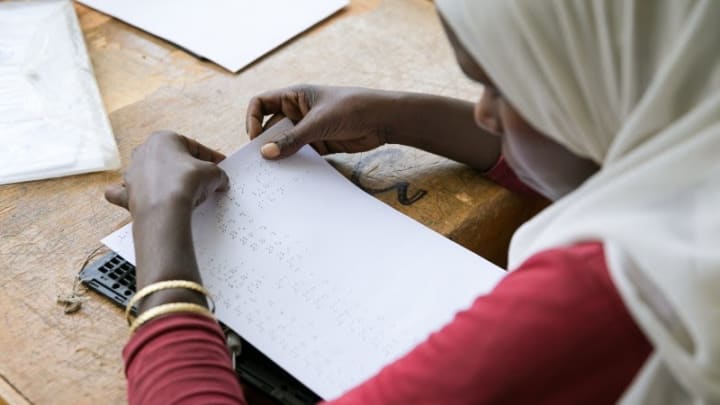By Ifeanyi Nsofor, Shubha Nagesh

How can we plan better for the unique needs of persons living with disabilities? Photo by: Kelley Lynch / GPE / CC BY-NC-ND
A 12-year-old visually impaired girl in India recently died for lack of food, medicines, and financial help — all things which were harder to access during the coronavirus lockdown. She could not get the social services she needed because she did not have an Aadhaar card — a unique identification card. Her death underscores the neglect and poor care that persons living with disabilities face in this time of COVID-19.
Globally, there are cases of persons with disabilities suffering untold hardships at home, in communities, hospitals, and hospices in this time of COVID-19.
In the United Kingdom, a man living with mental distress and diabetes starved to death because he was unable to secure home deliveries from supermarkets. He was obeying the government’s stay at home directive.
In Nigeria, some persons living with disabilities could not access food palliatives distributed by the government. It was not taken into consideration that these individuals who are visually and physically impaired would find it extremely difficult or almost impossible to move from their homes to distribution centers.
And in India, the 26 million people living with disabilities continue to face attitudinal, environmental, and institutional barriers that are worsened by COVID-19.
The list is endless.
The death of the 12-year-old girl in India is an absolute indication for governments to plan better for logistical, health, and other social needs of persons living with disabilities — now and during future pandemics.
We propose these five areas as guides.
1. Consider unique needs
COVID-19 has thrown up the need to include palliatives in future plans for epidemic preparedness, but we must ensure that the unique needs of persons with disabilities are considered when planning for palliatives.
For example, foods must be taken to residences of persons with disabilities instead of expecting them to come to central collection points. In instances when national security requirements may interfere with services, governments must find other ways of ensuring that persons living with disabilities are not denied their rights. Furthermore, other palliatives, such as dedicating caregivers to persons with disabilities, would better ensure that their needs are fully met.
2. Coordinate
Governments and civil society organizations must work closely with associations of persons living with disabilities to coordinate care, provide support, and ensure their rights are protected.
Such associations know their members, the types of disabilities they live with, their particular needs, and where they live. These associations also have established ways of reaching out to their members and protecting their rights.
Disabilities will touch every person’s life … and everyone needs the knowledge, skill, and a plan, all of which can encourage… fair treatment of all patients with disabilities who come to hospitals for care.—
There are lessons from Zimbabwe, where three associations of people living with disabilities took the Zimbabwe Broadcasting Corporation to court, demanding that information on COVID-19 be provided in accessible formats to people living with visual and hearing impairments.Get development’s most important headlines in your inbox every day.Subscribe
3. Focus on primary care
It is important to strengthen primary health care for persons with disabilities. Presently, many barriers prevent persons with disabilities from accessing emergency care at specialist hospitals. Therefore, it is important for care to be provided at the primary health care level, close to where they reside.
To achieve this, community health workers who can do home visits should be trained to offer non-specialized services, stabilize the patient, and, if there is a need, accompany them to specialist hospitals. A functional referral pathway is needed to ensure a continuity of care. Rwanda’s network of 45,000 community health workers provides a good model to be adopted by other countries.
4. Develop a patient-centered approach
Health care for people living with disabilities must develop a patient-centered approach, with individualized care. People living with disabilities first and foremost must not be denied the right to choose — nor should their family if they are unable.
They must have the choice to select alternate options and opt out of being categorized in a generic manner as someone whose life is worth any less than the patient who is not with a disability.
The focus of treatment should be the condition and its associated challenges, never the disability. An ethical perspective to medical treatment of people with disabilities will lend dignity for the patient and respect for opinions and wishes of the patient
5. Plan a curriculum
Develop a curriculum on disability to be used in professional training of all tiers of health professionals, particularly medical students, nurses, social workers, pharmacists, laboratory scientists, and residents pursuing super specialties.
Disabilities will touch every person’s life, personally or professionally, and everyone needs the knowledge, skill, and a plan, all of which can encourage respectful, inclusive, and fair treatment of all patients with disabilities who come to hospitals for care.
To be sure, these ideas will take time and resources to develop. However, because of the likelihood of another pandemic occurring, this is the time to begin to prioritize the unique needs of people living with disabilities and develop plans for implementing them.
We must ensure no other person living with a disability dies because their rights are denied.
The views in this opinion piece do not necessarily reflect TQM’s editorial views.
About the authors
- Ifeanyi NsoforDr. Ifeanyi M. Nsofor is the CEO of EpiAFRIC and director of policy and advocacy at Nigeria Health Watch, Abuja, Nigeria. He is a senior Atlantic Fellow for Health Equity at George Washington University and a senior New Voices Fellow at the Aspen Institute.
- Shubha NageshDr. Shubha Nagesh works for the Latika Roy Foundation in Dehradun, India. She is a senior Atlantic Fellow for Health Equity at George Washington University. Shubha strives to make childhood disabilities a global health priority.


